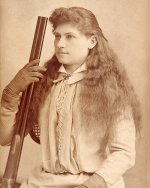I first met him during a show called the Sitting Bull Connection when he flattered me asking the photographer to take a picture of us two together.
“Wow”, I thought, “fancy the big chief wanting to be pictured with a five-foot-tall slip of a girl like me.”
But he seemed genuinely pleased to do so and was very complimentary about my shooting ability with my Winchester 73.
I next worked with Sitting Bull on the Buffalo Bill's Wild West where he paraded magnificently on his horse dressed in a colourful traditional Native American headdress.
It was then that he invited me to visit him on his reservation at Standing Rock.
My female friends warned me that it wasn't a wise move to meet him without a chaperone.
“Annie be very careful. Not only he's married with five wives but he has a reputation for being a womaniser.”, they said, “Take your gun with you for your protection, just in case. ”
But I dismissed all speculations as pure jealousy. I knew him to be the quiet and dignified man that earned him the boyhood nickname of 'Slow'.
So there we were, the two of us alone in his tepee to which I had been led by Light Hair, one of his wives. What better reassurance could I've possibly asked.
To further demonstrate his peaceful intentions, he offered me the calumet. I took a couple of puffs, trying not to cough and gave it back to him. I noticed, while examining his rugged face, how expertly he sucked on the long-stemmed ceremonial pipe.
I wanted to be told of his heroic exploits, of his desire to improve the life of his tribesmen by educating them and of his determination of opposing future erosion of the indigenous people's rights.
He was very pleased to be asked about all that and embarked on a long and fascinating narrative.
“I killed my first buffalo when I was 10”, he said with pride, “and earned my spurs at 14 by knocking a Crow warrior from his horse with a tomahawk during a raiding party and from then on I was known as Tatonka-I-Yatanka but you can call me 'Slow' as I am still a child at heart,”, he added with a smile and I wondered if he was flirting with me.
He went on to describe the occasion when the Sioux clashed with the U.S. Army trying to block the construction of the Northern Pacific Railroad and he, to show his contempt, sat in front of the lines, smoking his pipe, while bullets were flying round his head. On finishing his smoke, he cleaned the pipe and walked off unconcerned about the gunfire.
I had heard from other people, in dribs and drabs, accounts of his bravery and prescience that had enabled him to be the legendary figure who became the supreme leader of the Lakota Sioux. Now I was hearing straight from the horse's mouth confirmation of all that.
But he wasn't boasting and gave a lot of credit to his uncle
Four Horns for spearheading a campaign to unite the autonomous tribes. He was similarly modest in not claiming to have the gift of prophecy.
He said that the premonition that his warriors would triumph at Little Bighorn came to him in a dream rather than a trance, as rumours had it.
He had not participated to the attack against Custer's Seventh Cavalry and victory by the Sioux had simply been a question of superiority in numbers.
Altough gripped by his absorbing recollection, I wanted to know more than just a proclamation of daring deeds. I wanted to ask questions that he may think mundane but were relevant to me. What was the role of women within the indigenous community?
How did emotions, love, insecurity affect his personal life?
“Our women”, he said, “contrary to popular misconception, are not subservient and put upon but they are very influential; what you may call 'the power behind the throne'.”
He stated that his domestic situation was satisfactory and that all his wives, whom he loved in equal measure, lived together in harmony. I would have liked to ask their opinion on the matter but didn't get the chance.
I could have been an attractive addition to his 'menagerie', he remarked, but as I had said I was happily married to Frank Butler, would I accept to be his adopted daughter? I replied that I'd be honoured and he bestowed on me the nickname Little Sure Shot.
I could see that he was getting uncomfortable about my probing because he suddenly said:
“That's enough about me, tell me all about you.”
I knew that I had to be honest and reveal the harsh reality of my early life.
Following my father's death, to support my widowed mother and six of my surviving sisters,
at the age of seven I began shooting and hunting games that I sold to local shopkeepers and to restaurant in Ohio.
As that wasn't enough to keep the wolf from the door, I went to work for a family whose name I have erased from my memory because they made my life a living hell.
They kept me in near slavery and subjected me to physical and mental abuse. I'll never forget the time when I was put out in the freezing cold with bare feet as a punishment.
Sitting Bull saw the anguish in my eyes as I was talking and was moved.
“You are very brave”, he said, “to have endured all that suffering and overcome all your difficulties. You are a celebrity now, thanks to your exceptional marksmanship.”
It was true that my shooting ability had proved useful but I think that it was fate that I should beat my future husband in a shooting contest, at the age of 15. It was a turning point in my life.
“I am proud to be your new father, Little Sure Shot”, said Sitting Bull,
© Luigi Pagano 2020



